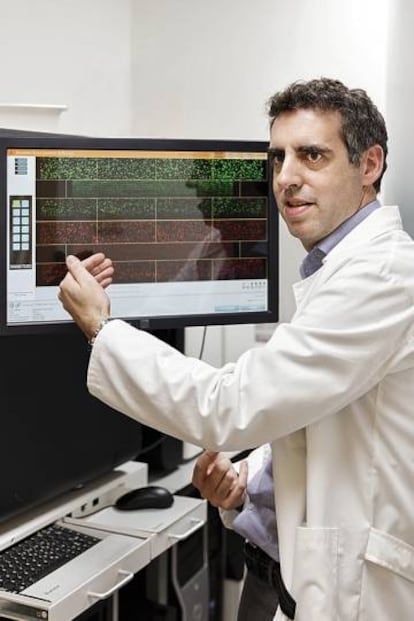Manel Esteller: The man fighting cancer with brainpower
Spanish researcher warns that young talent is going unnoticed due to lack of funds to develop potential
An expert in epigenetics, the study of heritable changes in gene expression, Manel Esteller is recognized internationally for his successful strategies to combat cancer. He puts his own success down to “luck and a stubborn nature,” a combination that has helped get him the funding he needs for his groundbreaking work.

Between his research, his family and his love of soccer, Manel Esteller, 48, doesn’t have time to be afraid of cancer. He’s also a pragmatist. “Cancer mainly strikes between the ages of 60 and 65, so I can park that worry for a while,” he says.
“I’m still not high risk. I don’t drink much, hardly go out in the sun and there isn’t a strong genetic link,” he explains, adding that cancer is one of the three most prevalent diseases in our society, along with heart disease and dementia. “Ours is the society that has lived the longest. Now the concern is how to live better.”
Faced with deeper and deeper budget cuts to research like his, Esteller says if things do not improve in Spain, he will pack his bags and go
With a track record that has earned him recognition on both sides of the Atlantic, Esteller is at the top of his game. His expertise in the field of epigenetics has won him Spain’s coveted National Award for Research, and his success has undoubtedly contributed to his direct, quick-witted and outgoing manner, a far cry from the awkward youth who struggled to find friends at school.
“I was shy and didn’t go out much,” he says, adding that instead, he discovered a love for detective novels and a passion for observing the world around him, first as a game and later through a microscope.

With an IQ of 142, Esteller is among the world’s top 2% – an intelligence level that set him apart from his schoolmates in Barcelona. He was interested in antibiotics and Alexander Fleming when the only Fleming his schoolmates had heard of was the author of the James Bond novels. At 16, he published his first article on cancer in a science magazine that he founded with schoolmates at Llor High School, the same one that NBA star Pau Gasol would attend later.
Esteller’s background also contributed to his success. His father, who was a farm boy, came to the Barcelona dormitory town of Sant Boi de Llobregat from Castellón to look for work at the age of 15, and found a job with Spanish flag carrier Iberia.
“That meant that as children we were able to travel when almost nobody else did, which affected me in different ways. Today, for example, I try to involve people from all over the world in the laboratory.”
His team at the Bellvitge Institute of Biomedical Research is made up of 80 people from 10 countries and he is always on the lookout for new talent. He himself studied at the prestigious Johns Hopkins University, and he casts his net wide.
“I was from a humble family and it was a combination of stubbornness and luck that got me good grants,” he says. “The danger today is that young talent is going unnoticed because there are no funds to develop potential. The lack of funding for science is largely due to a lack of interest from the politicians.”

While doctors are looking to cure cancer today it is researchers who are working on the cures of tomorrow, says Esteller. Twenty years ago, 75% of cancer cases ended in death; that figure has since been reduced to 40%, a fact that appears to have escaped the notice of those holding the purse strings, he says.
Faced with deeper and deeper budget cuts to research like his own, Esteller says if things do not improve in Spain, he will pack his bags and go. “My son already speaks perfect English in case that moment comes,” he says.
The walls of his office are adorned with photos of Catalonia’s Diada National Day, along with Barcelona FC paraphernalia, soccer being his main distraction when he’s not with his son or working, which he does for the best part of 12 hours a day.
“Some people count the days until Friday. Not me. Monday always seems like a great day,” says Esteller, whose dedication to his work is unwavering. “I get a buzz from people who believe in what we’re doing,” he adds: “just ordinary people who stop you in the street to tell you that.”
English version by Heather Galloway.
Sign up for our newsletter
EL PAÍS English Edition has launched a weekly newsletter. Sign up today to receive a selection of our best stories in your inbox every Saturday morning. For full details about how to subscribe, click here.
Tu suscripción se está usando en otro dispositivo
¿Quieres añadir otro usuario a tu suscripción?
Si continúas leyendo en este dispositivo, no se podrá leer en el otro.
FlechaTu suscripción se está usando en otro dispositivo y solo puedes acceder a EL PAÍS desde un dispositivo a la vez.
Si quieres compartir tu cuenta, cambia tu suscripción a la modalidad Premium, así podrás añadir otro usuario. Cada uno accederá con su propia cuenta de email, lo que os permitirá personalizar vuestra experiencia en EL PAÍS.
¿Tienes una suscripción de empresa? Accede aquí para contratar más cuentas.
En el caso de no saber quién está usando tu cuenta, te recomendamos cambiar tu contraseña aquí.
Si decides continuar compartiendo tu cuenta, este mensaje se mostrará en tu dispositivo y en el de la otra persona que está usando tu cuenta de forma indefinida, afectando a tu experiencia de lectura. Puedes consultar aquí los términos y condiciones de la suscripción digital.









































